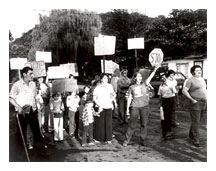| You
Got to Move (87 minutes) USA Producer: Lucy Massie Phenix Directors/Editors: Lucy Massie Phenix and Veronica Selver UNAFF screening schedule |
 |
||
|
You
Got to Move is film about a group of individuals involved in
various grassroots social change movements in the Southern United
States in the 80’s. The film shows community actions against
strip mining in Kentucky, toxic waste dumping in Tennessee and illiteracy
and discrimination in South Carolina. New issues in the Old South
include gay rights, help to Vietnam veterans and keeping out of
Central America. Lucy Massie Phenix is an editor, director and producer, who has worked for 30 years in advancing the creative field of documentary filmmaking. Some of her projects are: Winter Soldier (1971), a Cannes and Berlin Film Festival winning feature-length documentary of the historic testimony given by more than two hundred ex-GIs at the 1971 Detroit Winter Soldier Investigation concerning atrocities in Vietnam; The Life and Times of Rosie the Riveter (1980) a documentary of stories of women involved in skilled trades during WWII; Cancer in two voices (1993), a video documentary on the experience of a lesbian couple coping with one of them being diagnosed with breast cancer; Regret to Inform (1999), a portrayal of Vietnamese and American widows of the Vietnam war, nominated for an Academy Award for Best Feature Documentary, winner of the Indie Spirit Award and award-winner at the Sundance Film Festival. Veronica Selver, director/editor has been working in film for over 20 years. She produced and directed an episode in the 1996 ITVS series, Positive. Her co-directing credits include You Got to Move about the social change in Southern US and First Look, a film on contemporary Cuban artists and Columbia Dupont award winner Word is Out, the first feature documentary on growing up gay in America. Her editing credits include also public television's most highly regarded
broadcasts: On Company Business, a three part series
on the history of the CIA; the Academy Award nominated Berkeley
in the Sixties, as well as Harry Bridges: A Man and
His Union; Absolutely Positive, on people living with HIV; Coming
Out Under Fire, on gays and lesbians in the military during
World War II, and Blacks and Jews. Lucy
Massie Phenix, Producer/Director
|
|||